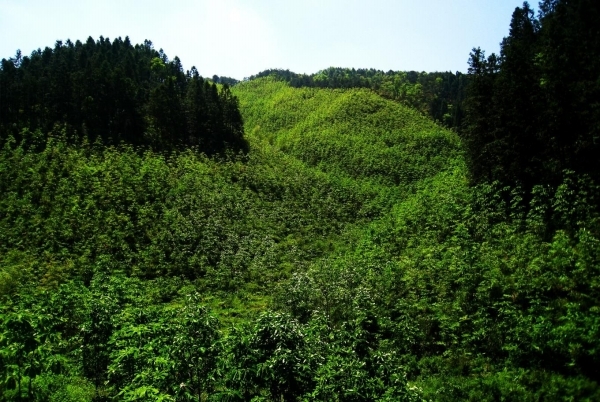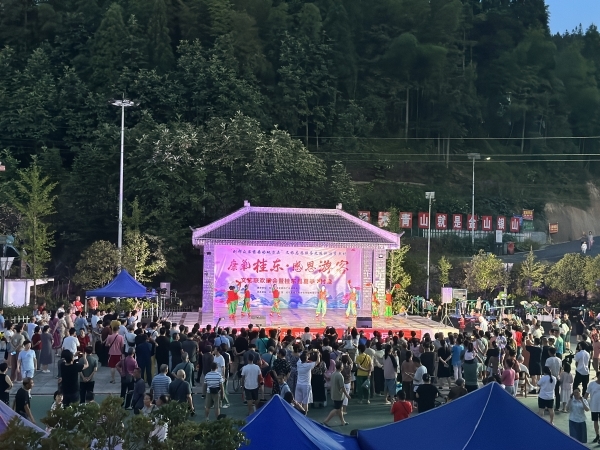Traditional Chinese herbs empower Guidong county's wellness tourism
2024-08-22
With an average altitude of 900 meters, there are 1,246 kinds of wild medicinal plants in Guidong County, Chenzhou City, including 109 national key protected varieties. Guidong monk fruit and rhizoma polygonati are GI products.
Now, the planting area of medicinal herbs in the county reaches 250,000 mu (about 16,666.67 hectares), with an annual output of 30,000 tons and an output value of about 1.32 billion yuan.

Guidong, with an average temperature of 23 degrees Celsius in summer, is a national health county and a national famous county for health tourism. It has been rated as a famous county for ecotourism. It has been selected as one of the most beautiful counties in China for seven consecutive years.
In the first half of this year, the county received 1,160,700 tourists and a total tourism revenue of 1.327 billion yuan.
The 2024 Conference on Innovative Integration and Development of Traditional Chinese Medicine Industry and Wellness Tourism was held in Guidong County, Hunan Province on August 17. Experts and scholars from the national TCM and wellness tourism gathered here to give suggestions for the integrated development of TCM and tourism.
Guidong is located at the border of Hunan and Jiangxi provinces, at the southern end of the Luoxiao Mountains, with an average altitude of 900 meters and a forest coverage rate of 81.97%.
At low latitudes and high altitudes, the annual average temperature is 15.8 degrees Celsius, and the average summer temperature is 23 degrees Celsius. There are 46,000 negative oxygen ions per cubic centimeter on average, with the highest instantaneous value of 150,000 per cubic centimeter.
The unique natural conditions, special geographical regions, and fertile humus soil have created a pure natural, high-quality paradise suitable for the growth of traditional Chinese medicine.
Guidong County has a long history of planting Chinese medicinal herbs. In the 1950s, a large number of medicinal herb farms were run in Guidong County with herbs of high production and good quality.
In the 1970s, Guidong County was regarded as a medicinal herb base for Mangnolia officinalis, tu-chung and cortex phellodendri, and then it had been rated as an advanced county for medicinal herb production in the province for five consecutive years.

Since 2016, the county government has taken the Chinese medicinal herb as a characteristic industry, providing over 10 million yuan of funds annually to help the industry grow in scale and increase benefits.
“In the fourth national general survey of traditional Chinese medicine resources, our county collected 849 kinds of medicinal plants, including 109 key varieties, 740 common varieties, 5 kinds of germplasm resources, and more than 850 kinds of Chinese herbal medicine specimens.” An official of the Agricultural and Rural Bureau of Guidong County introduced that authentic medicinal materials such as monk fruit, Magnolia officinalis and other herbs planted in Guidong have superior medicinal properties and quality. Tested by professional institutions, their content of active ingredients was far beyond the national pharmacopoeia indicators.
Rhizoma Polygonati and monk fruit have received the “National Geographic Certification Trademark”, and Lilo tea of Guidong has been listed as “National Geographic Indication Protection Product”.
The traditional Chinese medicine industry in Guidong has been successfully included in the “Guiding Catalogue for the Development of Leading Characteristic Industries in Hunan Province”. The county has been approved as a demonstration county for TCM planting bases in the province.
The county also issued relevant incentives to vigorously support the industrial development of the Chinese medicinal herbs.
The county now has 14 leading enterprises in the cultivation of traditional Chinese medicinal materials, 38 specialized farmers' cooperatives, including 1 national demonstration cooperative and 1 provincial demonstration cooperative. There are more than 560 large businesses engaged in the industry, which have created 58,400 job opportunities for villagers.
The development of traditional Chinese medicine industry in towns and villages such as Oujiang, Datang, Pule, Shatian, and Sidu is thriving.
Driven by leading enterprises, business models such as company plus cooperative plus base plus farmer, cooperative plus base plus farmer and family farm plus farmer are adopted to build a close interest linkage mechanism and make the industry stronger.
As of now, Guidong County has built 26 1,000-mu (about 66.67 hectares) traditional Chinese medicine planting bases, with a total area of 250,000 mu (about 16,666.67 hectares), with an annual output of 30,000 tons and an output value of about 1.32 billion yuan.
In the scorching summer, Guidong County is the first choice for self-driving lovers and the elderly in Changsha, Hengyang, Guangzhou and other places to escape the summer heat.
The county government makes full use of cool resources and enriches cultural tourism formats to vigorously develop all-for-one wellness and summer tourism.

As of now, there are nearly 1,000 homestay inns with over 20,000 beds in the county, as well as boutique homestay clusters and mid- to high-end homestay inns.
In recent years, the county government has worked to build a strong tourism county. The comprehensive air quality index ranked first in the province for six consecutive years.
The county government has taken a series of measures to attract tourists through upgrade of scenic areas, improvement of living environment and service enhancement.

Every summer, the county organizes a series of activities like evening shows, calligraphy and painting exchanges and telling Red stories to enrich tourists’ spiritual and cultural life, enhance their experience and promote the integrated development of culture, tourism and wellness.




